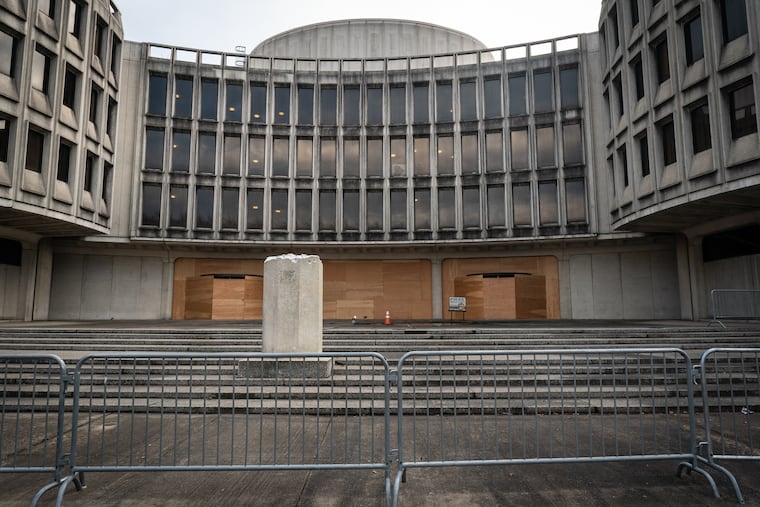Whatever happens to the Roundhouse, the process must be transparent and benefit Philadelphia | Editorial
Saving and repurposing the former Philadelphia Police Headquarters is worth exploring before any rush to demolish it.

The Philadelphia Historical Commission’s decision not to approve preservation protections for the former city Police Headquarters known as the Roundhouse raises an important question: What’s next?
Before there is any rush to demolish the unique Brutalist concrete hulk, the city should seek proposals from development partners to either renovate the Roundhouse or tear it down and redevelop the nearly three-acre site at Seventh and Race Streets.
Some argue that the Roundhouse’s history as a place where suspects were held in jail cells and the Philadelphia Police Department’s history of racism, brutality, and corruption make the building uninhabitable.
Any reuse of the four-story, 125,000-square-foot structure built in 1963 should include recognition of its past that could be used as a teaching tool. Perhaps the best outcome would be to make something good out of something bad.
» READ MORE: Center City arena plan is missing its two most positive proposals | Editorial
Could the Roundhouse be transformed into affordable housing, with some units set aside for those who were wrongly convicted? Or could it become a high-tech incubator that includes a job training and literacy facility for former inmates? Could it be used as a magnet school that prepares the city’s future leaders?
There is no doubt the Roundhouse — with its undulating concrete contours — is distinctive. So saving the structure is worth exploring before any rush to demolish it. Better proposals that call for demolishing the Roundhouse should be explored, as well.
But the process must be open and transparent. And the property should not be sold to a politically connected developer who may sit on it for years on end. City taxpayers have seen that bad movie too many times.
We’re looking at you, Germantown YMCA.
Nor should the Roundhouse become a political pet project where millions of tax dollars go to a hodgepodge of half-baked ideas.
We’re looking at you, Provident Mutual Bank.
A better model is the one used to create a master plan for Philadelphia’s Delaware River waterfront. In 2006, then-Mayor John F. Street signed an executive order to create a civic vision for the waterfront that was led by PennPraxis.
Community input helped shape the vision, which is slowly coming together to transform the waterfront. Redeveloping the seven miles of waterfront is much more ambitious and complex, but creating a vision is key to the Roundhouse.
Fortunately, a somewhat similar process has begun. In 2022, the city Department of Planning and Development contracted with Connect the Dots and Amber Art and Design to conduct surveys and focus groups to seek community input on what to do with the Roundhouse.
A report released last year found mixed feelings. Some had bad memories of dealings with the police and its history of corruption and brutality. Others said the building was “an architecturally exemplary building” worth saving.
The overwhelming feedback was for the site “to become a place for the community to reconnect and to heal.” Many suggested a mixed-use space for businesses, recreation, and art. All agreed the imposing wall around the perimeter of the property needed to come down.
» READ MORE: Ridership is up and crime is down, but SEPTA faces a challenging future | Editorial
There was widespread support to integrate the site with the Chinatown community and Franklin Square. That makes sense, but real designs and cost estimates are needed now.
In fact, the timing is perfect given the likely development of the Sixers arena on Market Street. Chinatown residents fear the arena may spur gentrification of their historic neighborhood.
The Roundhouse property could provide an opportunity for Chinatown to grow. Maybe the Sixers could help support the Roundhouse project as a way to gain some needed goodwill in Chinatown.
The next step is for the city to seek development proposals and make them public.
At the end of the day, it may be decided that the Roundhouse is not suitable for redevelopment, or is too costly and should be demolished. All the options should be explored so the best use of the property can be determined.
It will be up to the city to ensure that the legacy of the Roundhouse doesn’t go from bad to worse.